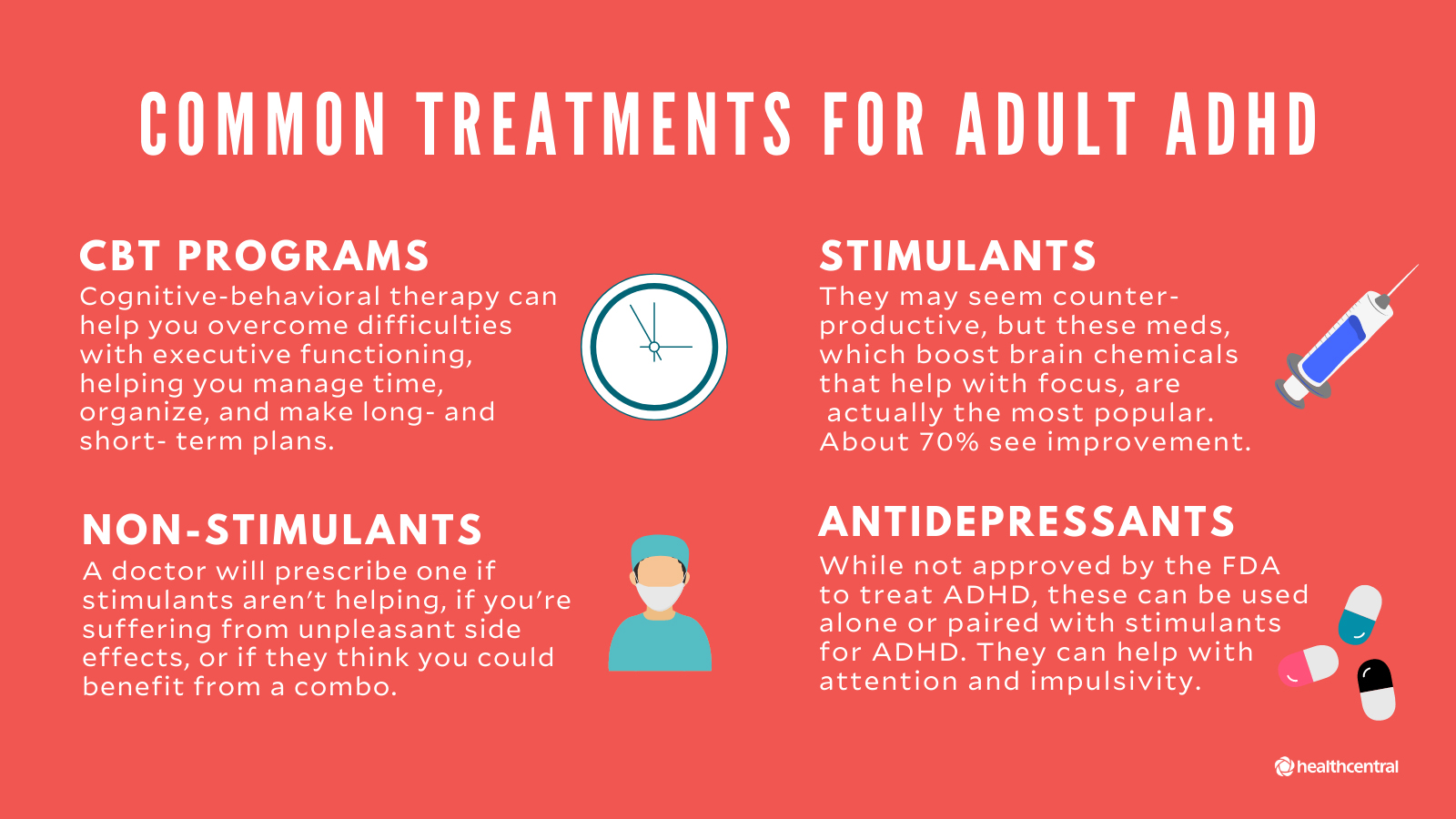Exploring Reliable ADHD Treatment Choices for All Ages
The complexities of Attention deficit disorder (ADHD) present unique obstacles throughout various age groups, demanding a thorough exploration of effective therapy choices. A combination of behavior modifications, medicinal interventions, and lifestyle alterations has revealed promise in attending to the diverse requirements of people with ADHD. The efficacy of these techniques can vary substantially based on personal situations, increasing vital inquiries concerning tailored methods. As we check out the spectrum of therapy modalities readily available, it becomes important to think about not only their instant impacts but likewise their long-term ramifications for people and family members.
Understanding ADHD and Its Influence
Attention-Deficit/Hyperactivity Disorder (ADHD) is a neurodevelopmental condition identified by persistent patterns of negligence, attention deficit disorder, and impulsivity that can significantly affect various facets of a person's life. It generally shows up in childhood years, although signs can linger into the adult years. The core signs and symptoms of ADHD can disrupt instructional performance, impede social communications, and complicate work undertakings.
People with ADHD typically fight with maintaining concentrate on jobs, organizing activities, and adhering to with on directions, which can lead to academic underachievement (Depression Treatment). In social contexts, impulsivity might cause problems in creating and sustaining connections, as people might interrupt conversations or make rash decisions without thinking about effects
The variability in sign discussion means that ADHD can affect people in a different way, necessitating an individualized technique to administration. Comprehensive recognition of ADHD's nature and implications lays the foundation for checking out appropriate therapy options customized to each person's demands.
Behavioral Therapies for ADHD
Many behavior treatments have been established to properly attend to the difficulties linked with ADHD, concentrating on changing specific actions and promoting vital skills. Among the most identified methods are cognitive-behavioral therapy (CBT), moms and dad training, and social abilities training.
CBT assists people recognize and transform unfavorable idea patterns and habits, advertising a more positive overview and improved self-regulation. This therapy often includes sensible methods for handling impulsivity and improving organization. Parent training programs encourage caregivers by equipping them with methods to enhance positive habits and set consistent borders, which can be particularly useful for children with ADHD.
Social abilities training is one more essential component, mentor individuals with ADHD how to interact effectively with peers - Depression Treatment. This technique commonly includes role-playing and comments to boost communication, teamwork, and dispute resolution skills
Integrating these behavioral therapies right into a thorough therapy plan can dramatically boost working and top quality of life for individuals with ADHD. Inevitably, the efficiency of these treatments depends upon customized approaches that consider the one-of-a-kind needs of everyone, therefore cultivating resilience and flexibility in life.
Medication Options Available
For several people with ADHD, drug can play a substantial function in taking care of signs and enhancing overall functioning. The 2 main classifications of drugs suggested for ADHD are energizers and non-stimulants.
Energizers, such as methylphenidate and amphetamine-based drugs, are one of the most generally made use of therapies. These medicines work by raising the levels of neurotransmitters, specifically dopamine and norepinephrine, in the brain, which aids enhance interest and minimize impulsivity and attention deficit disorder. They typically produce fast results, making them a favored option for several people.

It is important for health care carriers to conduct an extensive analysis to determine one of the most ideal medication based upon individual requirements, case history, and possible adverse effects. Routine follow-up and monitoring are additionally crucial to guarantee the performance of the picked therapy and to make any type of essential modifications.
Way Of Living Changes to Take Into Consideration
Managing ADHD effectively expands past medication, as way of living modifications can dramatically improve general well-being and sign control. Integrating structured routines is vital; constant schedules assist individuals with ADHD manage their time properly and lower sensations of overwhelm.
Routine exercise is one more essential element. Exercise not only aids to improve concentration yet also improves mood and minimizes stress levels. Activities such as yoga or group sporting activities can be specifically useful, advertising both physical health and fitness and social communication.
Nutrition also plays a pivotal function. Depression Treatment. A well balanced diet regimen rich in omega-3 fats, entire grains, and lean proteins can contribute to boosted focus and cognitive feature. Restricting sugar and processed foods is suggested, as these can intensify hyperactivity avenues psychiatry and counseling services and impulsivity
Rest hygiene is crucial for handling ADHD signs and symptoms. Developing a normal sleep routine and creating a relaxed atmosphere can improve sleep high quality, leading to much better interest and emotional law.
Alternative and Alternative Strategies
Different and alternative methods to ADHD treatment use a diverse array of alternatives that enhance traditional methods. These strategies usually concentrate on way of life alterations, dietary interventions, and therapeutic practices that intend to improve total health while addressing ADHD signs and symptoms.

Mindfulness and behavior therapies are likewise getting traction as alternative interventions. Practices such as yoga exercise, reflection, and cognitive-behavioral treatment can grow self-regulation and boost interest. These approaches support psychological durability, which is particularly useful for people with ADHD.
Organic supplements, such as ginkgo biloba and ginseng, are in some cases discovered; however, it is vital to speak with healthcare specialists before incorporating these into treatment plans. While choice and all natural approaches can give useful assistance, they need to ideally be utilized along with evidence-based treatments to accomplish ideal results for managing ADHD across any ages.
Final Thought
In recap, effective ADHD treatment necessitates a comprehensive approach that consists of behavior treatments, medication, way of living modifications, and all natural approaches. This complex strategy emphasizes the importance of customized care in attending to the varied needs of individuals with ADHD antidepressants weight loss across all age teams.